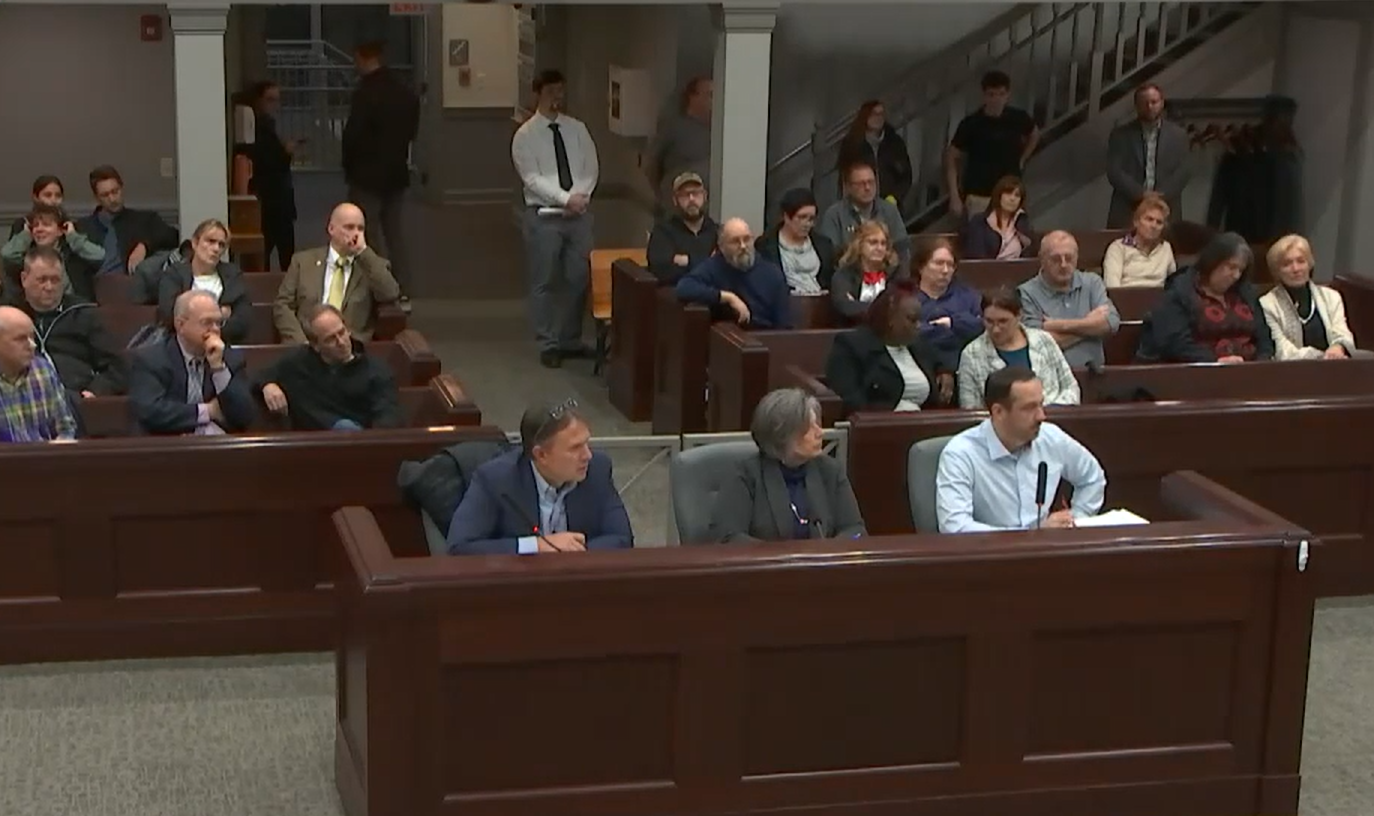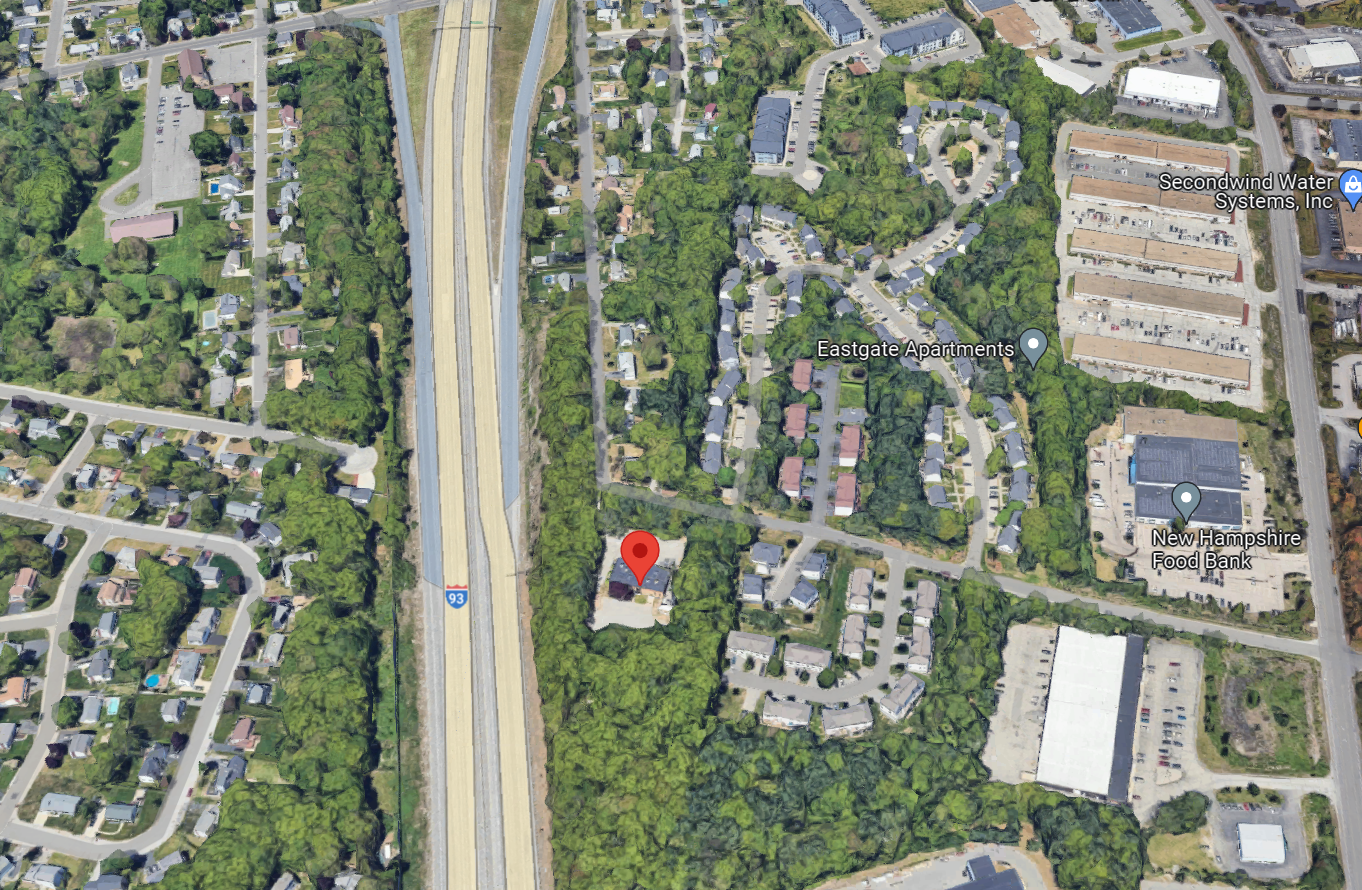
MANCHESTER, NH – Two of the opponents of a congregant care home in the former Daniel Webster Boy Scouts of America headquarters on Holt Avenue are seeking a rehearing on the Zoning Board of Adjustment’s January decision to allow the new use at the property.
The ZBA voted 3-2 after a contentious three-hour hearing Jan. 11 to allow a variance for Dismas Home of New Hampshire to proceed with a 20-bed transitional living home, as well as the organization’s offices, at 571 Holt Ave.
Two requests for rehearing were filed, by Benjamin Adams, of Waverly Street, and Attorney Andrew Sullivan, who represents some of the neighborhood’s residents. Both spoke against the variance request at the Jan. 11 meeting. The rehearing requests are listed on the March 14 ZBA agenda. The meeting is at 6 p.m. at Manchester City Hall. They are listed as administrative matters after the regular agenda items, which means that the board would discuss whether to have the rehearing, not hold the hearing itself.
According to ZBA bylaws, anyone who wishes to appeal a decision has 30 days to file an appeal asking for a rehearing. The applicant must show sufficient cause as to why the case is subject to review, the bylaws say. The ZBA’s website says, “Some reasons for a rehearing would be the introduction of new evidence to be considered or a change in circumstances that considerably alter the case.”
The requests for a rehearing on the Dismas Home variance say that the “procedural due process rights” of opponents were violated, because they were limited as to when and for how long they could comment, while the applicants for the variance could speak at length about the project. Applicants who are applying for a variance with the ZBA are not time-limited and spend much of a hearing answering questions from board members seeking to determine if the application itself qualifies for a variance. Public comment from people who have not applied for a variance, whether they oppose or support the request, are limited to three minutes per person. Those in favor of the Dismas Home application who were not part of the team requesting the variance, but just there to advocate for it, were also limited to three minutes per person.
Under New Hampshire law, a zoning board of adjustment has a specific framework under which they can grant a variance. The use must not be contrary to the public interest, observe the spirit of the zoning ordinance, do “substantial justice” (gain to the general public by allowing the variance must outweigh loss to the individual by not allowing it), not diminish values of surrounding properties, literal enforcement of the ordinance would result in unnecessary hardship.
The project needed a variance because the 2.5-acre property is in an industrial zone, where congregate care isn’t permitted. The plot of land, however, is surrounded on three sides by residential zoning, where it would be allowed without a variance. The residentially zoned areas include single-family homes as well as large condominium developments.
The industrial-zoned plot in the sea of residential zoning was created when the neighboring land was rezoned from industrial to residential so the condominium development could be built years ago.

Most of those who spoke against the variance Jan. 11 said that they support Dismas Home’s mission, but it’s not the right fit for the neighborhood. They said they are concerned about property values, and many implied that Dismas Home residents would be a danger or nuisance in the neighborhood.
Some opponents argued that for those reasons, the variance would not meet the public interest requirement of the ZBA law. ZBA members pointed out that “public interest” under the law does not mean the specific interests of abutters and neighbors, but the overall public interest. The need for the type of services Dismas Home provides is critical in recovery, as well as addressing housing issues, and helps reduce recidivism, crime and homelessness. All of those are in the greater public interest.
Dismas Home has operated a recovery center on Fourth Street, on the West Side, since 2016. The Holt Avenue center would be a transitional home for women who have completed the 90-day program on the West Side. The women living at the Holt Avenue residence would be sober, learning life skills, and finding employment and a place to live.
The proposal is to renovate the interior of the 10,800-square-foot building with offices and living space. The women would live in two-bedroom suites with bathrooms and have a common living area. The proposal includes 20 beds for residents, five staff offices, and conference, treatment and meeting spaces.
Daniel Webster Council, which also needed a variance when it bought the property, occupied the building from 1982 to 2021. The council began to market the vacant property in May, and officially listed it in July for $1.3 million, a year and a half after the council’s board voted to put the property up for sale.
Dismas Home, which has been seeking space for some time, hadn’t closed on the purchase and sale, pending the variance.
The variance was approved with the conditions that any new owner can’t exceed the number of beds that Dismas Home has, and that a new owner would have to be certified by NH CORR.
The application contains a description of how the property will meet those criteria.
Aside from meeting the criteria, ZBA members, said that the stigma surrounding recovery, mental health and incarceration should not be a factor in their decision.
Dismas Home is licensed as a level 4 treatment program. Qualifications to become a resident are “very vigorous,” Cheryll Andrews, executive director, told the board. Residents are there on a voluntary basis. “No one is forced [to be a resident], no one is mandatory. They come voluntarily and are free to go when they wish,” Andrews said.
Women between 18 and 64 who fall below the federal poverty level by 400%, are justice-involved with no violent convictions and no violent behavior during their incarceration and are a minimum 30 days sober are eligible for the program, she said.
Residents have a 9 p.m. curfew, are prohibited from using drugs and alcohol, as well as many other requirements. If they violate them, they’re out of the program.
Eric Kilchenstein, the attorney representing Dismas Home, said at the hearing that, in general, the project meets the New Hampshire Supreme Court’s definition of not being contrary to the public interest, including not altering the essential character of the property or posing a threat to the health, safety and welfare of the public. The specifics are listed on the six-page application to the ZBA.
He added that Dismas Home “fills a pretty significant need in NH.” The use also provides a quiet, safe place that would be monitored by staff. “This is an improvement to the property.”
The sale of 571 Holt Ave., as well as the Daniel Webster Council’s property in Unity, is necessary as part of the national BSA’s bankruptcy proceeding as it pays a $3.5 billion lawsuit to settle sexual abuse claims.
While the DWC’s board approved listing both properties in late 2021, it had to wait until the national BSA settlement was agreed to and its Chapter 11 bankruptcy resolved. The settlement agreement was finalized in March 2023, and the bankruptcy was settled last April. Marketing of both DWC properties began in May, with the listing made public in July.
The council had been trying to find a buyer well before the bankruptcy was settled, as part of the bankruptcy process, Kilchenstein told the ZBA.
He said under the zoning “it could be a variety of things,” but no business has shown an interest. “It’s an island of zoned industrial surrounded by residential.”
Along with “the extraordinary need for this service,” the fact Dismas Home was looking for property, and the fact it has been vacant for so long, “we got kind of a marriage of needs,” he said.







